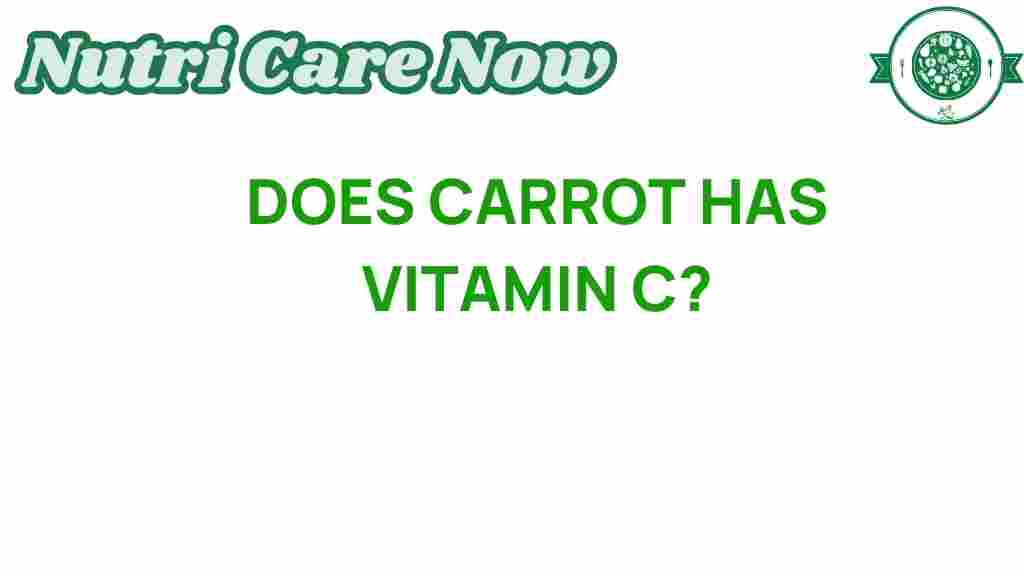Unveiling the Truth: Does Carrot Really Pack a Vitamin C Punch?
When it comes to nutrition, carrots are often celebrated for their vibrant color and crunchy texture. While many people associate carrots primarily with their high beta-carotene content, a common question arises: does this popular vegetable also deliver a significant amount of vitamin C? In this article, we will explore the nutritional profile of carrots, their health benefits, and whether they truly provide a vitamin C punch. We’ll delve into the role of carrots in a balanced diet and discuss their potential as a source of antioxidants and immune support.
The Nutritional Profile of Carrots
Carrots are a versatile vegetable that can be enjoyed raw, cooked, or juiced. Here’s a breakdown of some key nutritional components found in a medium-sized carrot (approximately 61 grams):
- Calories: 25
- Carbohydrates: 6 grams
- Fiber: 1.5 grams
- Protein: 0.6 grams
- Fat: 0.1 grams
- Vitamin A: 184% of the Daily Value (DV)
- Vitamin C: 7% of the DV
- Potassium: 6% of the DV
As you can see, carrots are indeed a good source of various vitamins and minerals, with vitamin A being the most prominent. However, when it comes to vitamin C, they provide a modest amount. This leads us to investigate the significance of vitamin C in our diet and how carrots contribute to our overall health.
Understanding Vitamin C
Vitamin C, also known as ascorbic acid, is a water-soluble vitamin that plays a crucial role in various bodily functions. Here are some of the key benefits of vitamin C:
- Antioxidant Properties: Vitamin C is a powerful antioxidant that helps to combat oxidative stress and free radical damage.
- Immune Support: It supports the immune system, helping the body to ward off illnesses and infections.
- Collagen Production: Vitamin C is essential for the synthesis of collagen, which is vital for skin health and wound healing.
- Enhances Iron Absorption: It aids in the absorption of non-heme iron from plant-based foods.
Given these benefits, incorporating vitamin C-rich foods into your diet is essential for maintaining health and preventing deficiencies.
How Do Carrots Compare to Other Sources of Vitamin C?
While carrots do contain some vitamin C, they are not the richest source compared to other fruits and vegetables. For instance:
- Oranges: A medium orange offers about 70 mg of vitamin C, which is significantly higher than a carrot.
- Kiwis: One kiwi contains approximately 71 mg of vitamin C.
- Bell Peppers: A medium bell pepper can provide up to 120 mg of vitamin C.
With this comparison, it’s clear that if you are looking to boost your vitamin C intake, you might want to include a variety of fruits and vegetables in your diet along with carrots.
The Health Benefits of Carrots Beyond Vitamin C
Despite their modest vitamin C content, carrots offer numerous health benefits that make them a valuable addition to any diet:
- Rich in Antioxidants: Carrots are loaded with antioxidants, particularly beta-carotene, which the body converts into vitamin A. This nutrient is crucial for maintaining healthy vision, skin, and immune function.
- Heart Health: The fiber, potassium, and antioxidants in carrots contribute to heart health by helping to lower blood pressure and cholesterol levels.
- Weight Management: Low in calories and high in fiber, carrots can promote feelings of fullness, making them an excellent snack for those looking to manage their weight.
- Digestive Health: The fiber content in carrots aids in digestion and promotes regular bowel movements.
Incorporating carrots into your regular diet can help you reap these benefits while also enjoying their delicious flavor.
Incorporating Carrots into Your Diet
Adding carrots to your meals is easy and versatile. Here are some delicious ways to enjoy them:
- Raw Snacks: Enjoy baby carrots or carrot sticks with hummus or yogurt dip. This makes for a nutritious and satisfying snack.
- Salads: Grate or julienne carrots to add a crunchy texture to salads. They pair well with leafy greens and various dressings.
- Soups and Stews: Add diced or sliced carrots to soups and stews for added flavor and nutrition.
- Juices and Smoothies: Blend carrots with fruits and other vegetables to create a refreshing juice or smoothie.
For more creative carrot recipes, check out this link.
Troubleshooting Tips for Cooking Carrots
While cooking carrots is generally straightforward, here are some tips to enhance your culinary experience:
- Overcooking: Avoid overcooking carrots, as they can lose their vibrant color and nutritional value. Steaming or sautéing until just tender is ideal.
- Flavor Enhancement: To boost the flavor of cooked carrots, consider adding herbs and spices, such as thyme, ginger, or garlic.
- Sweetness Adjustment: If you find carrots too sweet when cooking, pairing them with savory ingredients can help balance their natural sweetness.
Conclusion: The Carrot’s Place in a Healthy Diet
Carrots are undoubtedly a nutritious vegetable that brings a host of health benefits to the table. While they do provide some vitamin C, they excel in other areas, such as being rich in antioxidants and promoting eye health. To maximize your vitamin C intake and overall nutrition, it is recommended to enjoy a variety of fruits and vegetables alongside carrots.
Incorporating carrots into your diet is simple and delicious, whether as a raw snack, in salads, or as part of cooked dishes. Remember, a balanced diet rich in diverse vegetables is key to maintaining good health. So, the next time you reach for a carrot, remember that while it may not be the highest source of vitamin C, it certainly packs a nutritional punch worth celebrating!
This article is in the category Health and created by NutriCareNow Team
